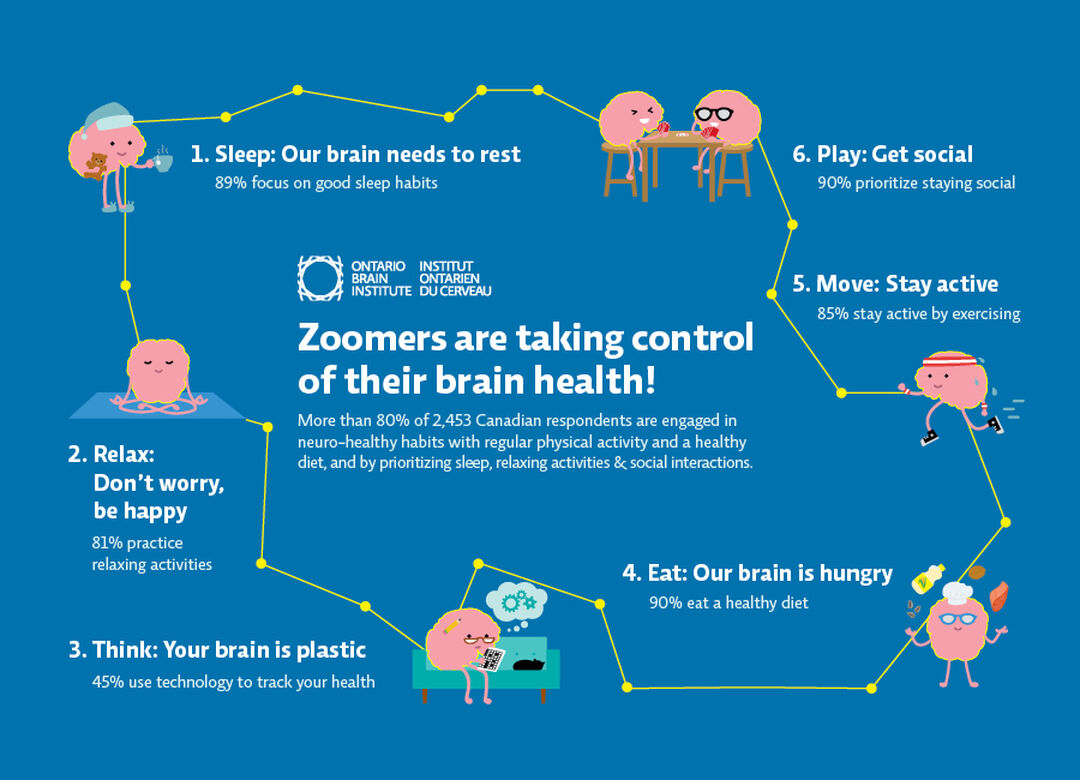What Canadians need to know about prioritizing brain health

March 10, 2025
Canadians, you made your voices heard. We need to take better care of our brains.
Whether in the news or being discussed across social media platforms, we’re seeing more interest in all things brain related. Increases in mental health awareness, proactive ways to mitigate cognitive decline, and a wellness boom focusing on brain-enhancing supplements, diets, and sleep tracking all signal curiosity about emerging technologies and how they might improve brain health.
Results from a national survey conducted by OBI and Zoomer Media confirm that people want to take better care of their brain health, and show that more information, education and access to resources and supports are needed.
Canadians are thinking more about brain health
March is Brain Health Awareness Month in Canada. This time last year, we wanted to understand how Zoomers think about brain health and what you need to support your brain health. You certainly told us! In just two weeks, 2,453 of you responded to our survey, with the most responses coming from people between 55-85. Over 85% of the individuals surveyed think about their brain health (46% occasionally and 39% frequently).
“The results of the brain health survey show that Canadians are actively engaging in neuro-healthy habits and activities like never before,” said Dr. Tom Mikkelsen, the Ontario Brain Institute’s President and Scientific Director.
“What really stood out to us in these results is that more than 80% of respondents are taking control of brain health with regular physical activity, a healthy diet, and by prioritizing sleep, relaxing activities, and social interactions with friends. Many of you also train your brain through exercises that contribute to maintaining cognitive well-being. Outstanding!”
The growing demand for brain health information
Canadians want reliable information from trusted sources to help them support their general brain health, and to offer strategies on ways they can prevent dementia (30%) and, more generally, improve their brain health (25%).
You told us that you want this information through interactive workshops, online resources and brain-training games and activities.
The Ontario Brain Institute heard you. To learn more about neuro-health and wellness all from all perspectives, tune in to one of our public talks.
Lots of interest in technology – but barriers remain.
Canadians are open to using technology for their brain health, with 71% of participants saying they already use mobile health apps or smart devices such as Apple Health, Fitbits, and Garmin watches. There’s an emerging category of technology related to brain health called neurotechnology. Often called neurotech for short, it’s a technology that gives us information about, or interacts with, the brain or nervous system. It helps us understand, control, or improve brain functions. However, concerns around these tools still exist, including uncertainty of which technology to use (32%), cost limitations (28%) and finding devices too complicated to engage with (25%).
To overcome these challenges, Canadians would like advice on which tool or device would work best for them to address their unique needs, citing the complexity of navigating what neurotech exist, and whether they are reputable. The Ontario Brain Institute wants you to help us figure that out, together.
Just as the brain is a complex organ, so too is the neurotech to support its healthy function. OBI can’t do it alone. We need to do it with you so that you can tell us what you like/don’t like, and what works/doesn’t work for you. Through programs like our Community-led Real-world neuroTech Experience, or CORTEX, we are partnering with community organizations to get neurotech into your hands, so that we can make sure it works the way it’s supposed to work and that it’s giving you agency over your brain health.
For example, through CORTEX, nearly 1,000 clients received unique care from two optometry clinics, Summerhill Optometry and Victoria Village Optometry, and the Alzheimer Society of Toronto that included questions about brain health and memory function during their intake process.
This enabled clients to undergo cognitive testing and participate in evaluating a new retinal scan developed by RetiSpec. RetiSpec is a Canadian start-up that has developed an exciting new technology to screen people rapidly and noninvasively during their routine eye exams. This novel technology could offer an easy, accessible, and scalable alternative to current methods of Alzheimer’s detection.
How the Ontario Brain Institute is bridging the gap
The survey clearly indicates that Canadians are ready, willing, and excited to take greater control of their brain health; and to do so, it’s clear you want and need more information, delivered in a way that is easy to understand and apply to your day-to-day lives.
By staying engaged and supporting trusted organizations like OBI, you CAN take meaningful steps toward a healthier, more independent future.
OBI is committed to working across the continuum of research, commercialization and care to make sure that we are fast-tracking evidence-based brain health solutions into your hands. If you want to stay in touch, subscribe to our newsletter.
You can also join us in thinking differently about brain health and support our cause.
